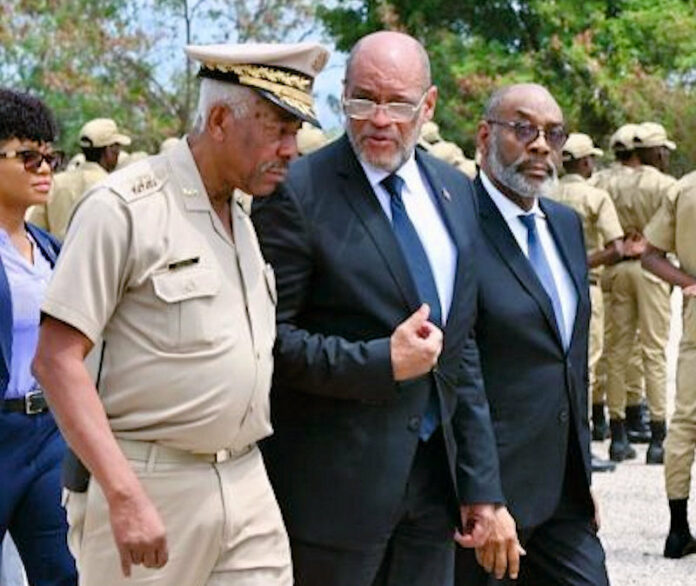
PORT-AU-PRINCE — The Haitian government has officially called on the Armed Forces of Haiti to reinforce the National Police of Haiti (PNH) in its fight against kidnappings and criminal gangs.
“Today we need all our security forces. We need the determination that drove the indigenous army,” Prime Minister Ariel Henry said during a visit to the army base on Fri., Mar. 17, 2023. “The Haiti that we wanted, we will not be able to build it with gangs that are rampant everywhere.”
“The bandits must listen to reason or we will make them listen to reason in spite of themselves,” Henry said. “We need a conjuncture of all the energies of the police, the army, and the collaboration of a united Haitian people to put an end to the criminal acts perpetrated on the population.”
Henry’s call for the Armed Forces of Haiti (FAd’H) – long feared because of its role as a tool of repression during and after the Duvalier regime (1957-1986) – to mobilize against rampant insecurity belies the desperation the country faces. The call comes as gang activity in Haiti has reached alarming new levels. Bandits have become more brazen and merciless, illustrated by increased sexual attacks on women, among others, in their battles. The ongoing conflicts between criminal gangs and armed neighborhood defense groups resisting them have caused the displacement of at least 155,000 residents.
“We believe the security and humanitarian situation in Haiti is worsening, and the situation on the ground will not improve without armed assistance from international partners.”
Over the past week alone, various heinous crimes have been reported. Eric Casséus, a manager at the Bank of the Republic of Haiti (BRH), who was approaching retirement after 42 years, was killed in an attempted kidnapping. Bandits kidnapped at least 10 people, including eight employees of the Ti Malice company in the Artibonite Valley town of L’Estère. A bus was hijacked with a dozen passengers aboard in Port-au-Prince.
“It’s a good thing insofar as we give the green light to these forces to act,” said Reynold Georges, a former soldier and lawyer, of Henry’s move. “We are all on edge and holed up at home. Threats are coming from everywhere. We cannot accept this situation.”
“I had long advised this move, and Henry finally follows through today, so we welcome the decision,” Georges added.
Georges, like many others, also criticized the “international community” for their role in Haiti’s plunge into insecurity, saying the gangs’ weapons come from abroad.
Indeed, various international bodies have acknowledged that arms smuggling in Haiti has gone unchecked for too long. However, many are hesitant to enter into another armed intervention in Haiti, citing past failures. In contrast, several international bodies have exited Haiti, including those of CARICOM and the Organization of American States (OAS), which do not show any interest in sending troops to Haiti. The United States and Canada, which pleaded before the UN Security Council in favor of the deployment of foreign military troops that Henry asked for in October 2022, have both demurred so far from leading an armed intervention in Haiti. However, U.S. President Joe Biden will travel to Ottawa on Mar. 23 to press Canadian Prime Minister Justin Trudeau to lead another deployment of foreign troops into Haiti, the third in three decades.
“We believe the security and humanitarian situation in Haiti is worsening, and the situation on the ground will not improve without armed assistance from international partners,” an anonymous U.S. National Security Council spokesperson told The Washington Post for a Mar. 21 article.
“My concern is just our capability as we rebuild, as we move to brigade level in Latvia,” Canadian Chief of Defense Staff Wayne Eyre told Reuters.
“There are only so much things to go around. It would be challenging,” added Eyre, explaining that Canada does not have the capacity to lead a force in Haiti because of its commitment in Ukraine.
“For me, the best way to restore stability for Haiti is first to sanction the elites to tell them that they can no longer finance the gangs,” said Canadian Prime Minister Justin Trudeau, who called on the United States and Europe to impose sanctions in Haiti, reports lapresse.ca.
An earlier version of this article was published on the website of The Haitian Times.










[…] Henry Mobilizes Haitian Army to Help Police Fight “Gangs” Haiti Liberte […]